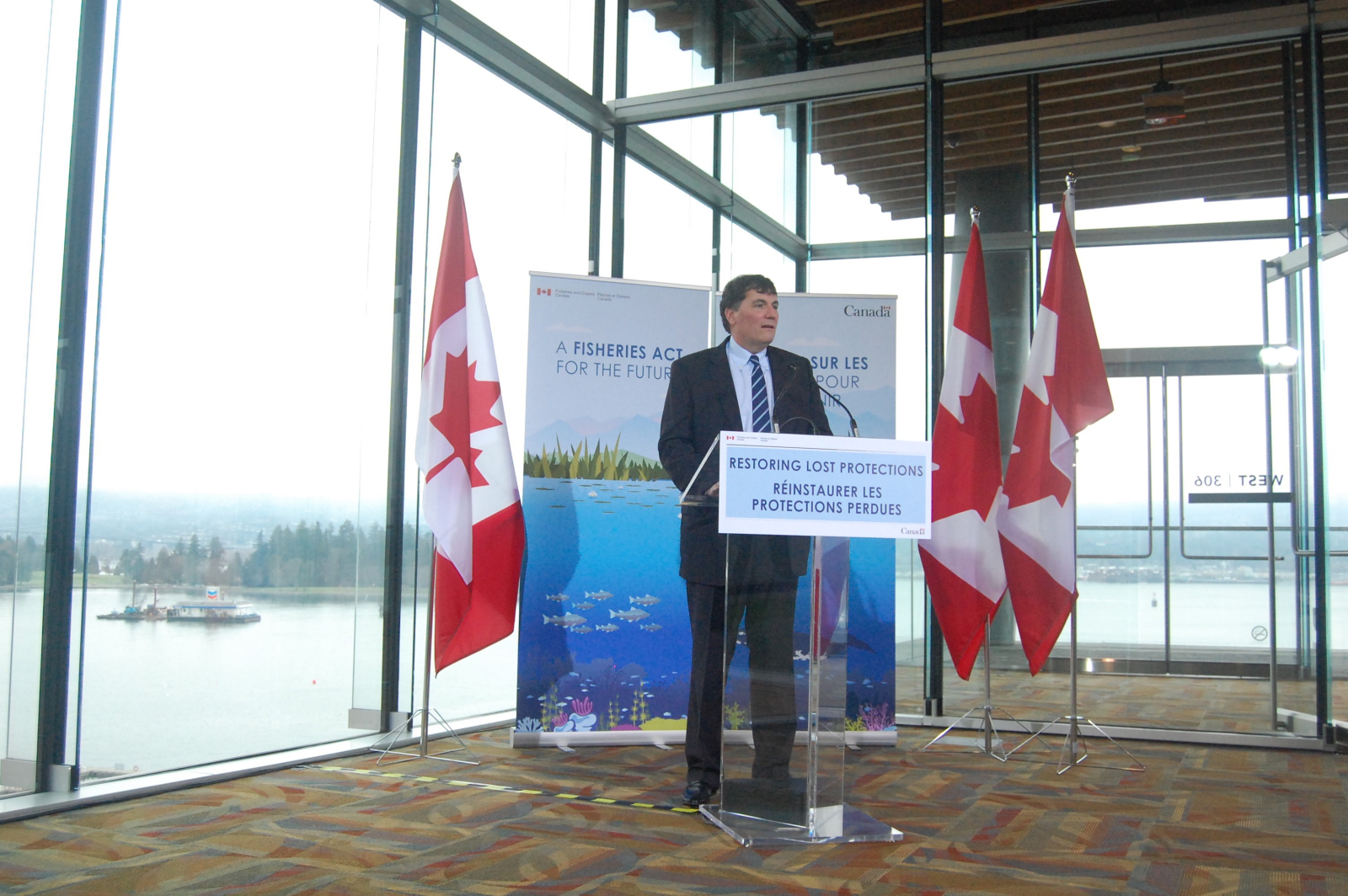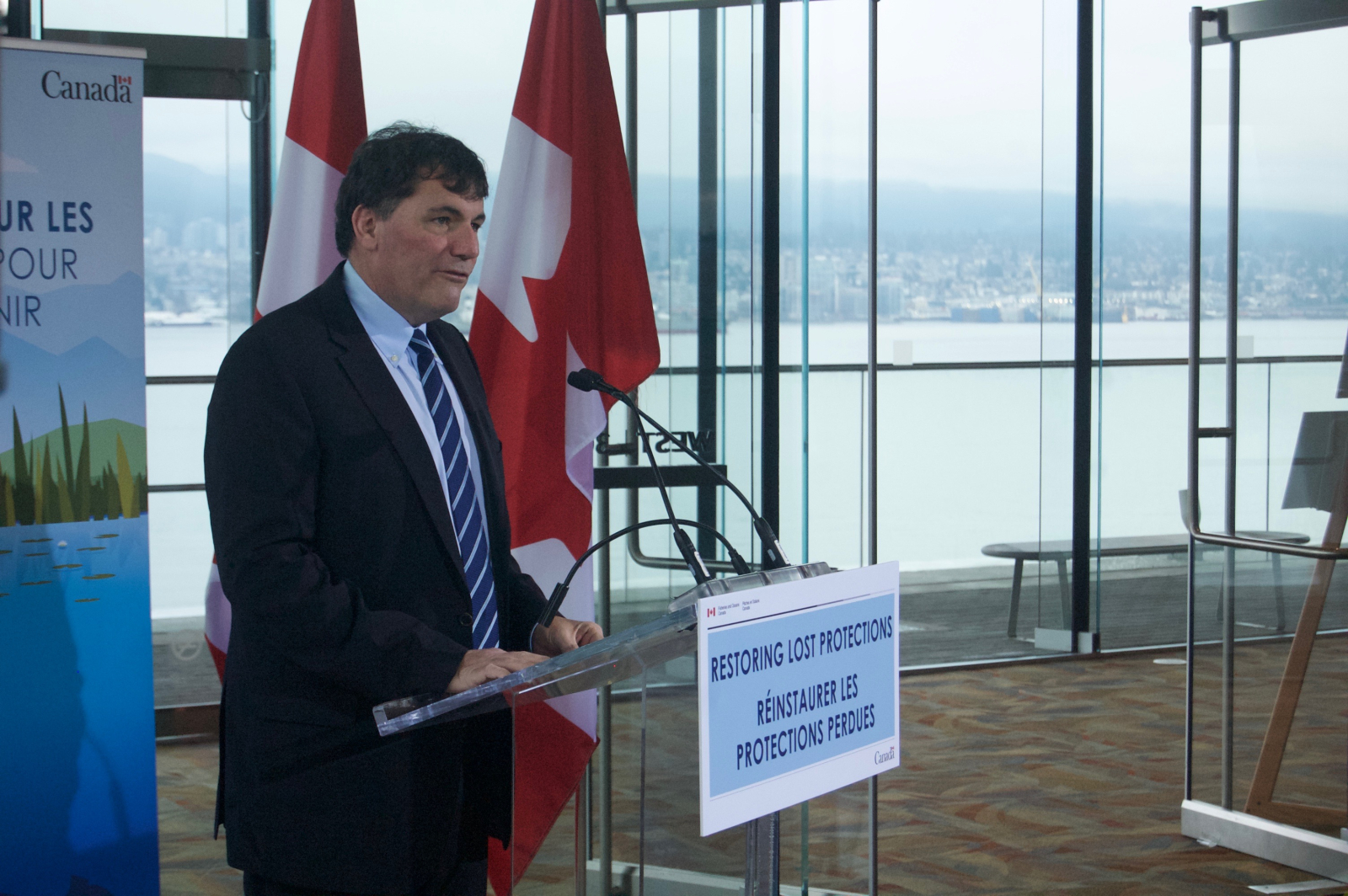The Trudeau government introduced sweeping changes to the main federal law protecting bodies of water on Tuesday, keeping a promise to repeal amendments adopted in 2012 and creating new obstacles for energy companies seeking to build pipelines that go beneath rivers, streams and lakes.
Bill C-68 would amend Canada’s Fisheries Act and other legislation to expand the scope of the law to cover all fish, repealing some controversial changes under former prime minister Stephen Harper that narrowed protections to fish species and habitat related to commercial, recreation or aboriginal fisheries.
The new 56-page bill also proposes beefed-up enforcement measures and new provisions around approving projects that incorporate Indigenous traditional knowledge. In addition, it requires the minister to set up a new "public registry" to allow for access to records. It also introduces an explicit requirement for the fisheries minister to protect Indigenous rights prior to making any decision related to the fisheries law.
“This was a foundational commitment we made to Canadians,” said Fisheries Minister Dominic LeBlanc, who unveiled the new bill in a convention centre in Vancouver.
"If we are to protect our waters for generations to come, the best place to start is to protect fish habitat."
The government is also committing "up to $284.2 million" over five years as part of the bill's unveiling. Federal officials from Fisheries and Oceans Canada told reporters during a technical briefing in Ottawa that the objective of this money was to increase the department's capacity to carry out its work, such as deploying more conservation protection officers on the water.

More obstacles for oil pipelines
The expanded scope may impact the approval of oil pipelines, confirmed the department officials in Ottawa prior to LeBlanc's news conference on the west coast. This is because the geographic area covered will likely be larger, as it is now based on the presence of any fish.
Representatives of Burnaby, B.C. have told federal regulators they believe Kinder Morgan's Trans Mountain pipeline expansion to the west coast will damage waterways and involves a vital area for fisheries. Texas-based Kinder Morgan has said it studied the protection of fisheries in its environmental plan. The firm did not immediately respond to a request for comment on the new bill.
Asked about the bill's impact on Trans Mountain, LeBlanc said “we understand the concerns of Canadians with respect to pipelines and with respect to the importance of having some of the most effective response capacity in the world about protection and prevention."
"I think that the best environmental response is prevention. The last thing we want to do is be in any way responsible for not having made the maximum effort possible with a whole series of partners to prevent some environmental circumstance from affecting the oceans and ecosystems," he said.
Departmental officials said they anticipated that the number of project reviews will go up, although they could not say by how much. There was a large range of authorizations under the current regime, from roughly 80 a year to 400 a year.
The minister will also be required to take new elements into account when deciding development projects. One of these is the requirement to study what the bill calls “cumulative effects” — a requirement to look at the state of an area before a project is developed, and determine if it can be sustained over time.

Traditional Indigenous knowledge to be 'confidential'
Another requirement in the new bill is for the minister to take “traditional knowledge of the Indigenous peoples of Canada” into account, if it has been provided, when considering fish habitat or pollution prevention.
This traditional knowledge will then be protected by the minister as "confidential," blocked from being disclosed without written consent. The bill even blocks the information from being accessed through Canada's freedom of information law.
The involvement of Indigenous communities “shouldn’t wait” until development projects are already proposed, said LeBlanc.
He framed provision on confidentiality as protecting the intellectual property of Indigenous knowledge.
"We think there’s an obligation on the government to consider traditional Indigenous knowledge in making decisions around the protection of fish and fish habitat," he said.
"We want Indigenous nations, as much as they’re comfortable, to share that knowledge with us, but there’s an [intellectual property] responsibility to protect that knowledge: that knowledge belongs to them, [and] if they want to share that with the public, that’s their decision."
The legislation also gives the minister new powers to strengthen conservation regulations and charge fees to recover costs for services, permits and authorizations.
'It’s really a sad day' says Conservative critic
The West Coast Environmental Law Association said it was "pleased to see full habitat protection finally restored for all fish across Canada."
“We are very glad to see the return of...the prohibition on altering, damaging or destroying fish habitat, and congratulate the government on repairing this hole in the torn legal safety net for Canadian fish,” said staff lawyer Linda Nowlan in a press release.
The association also praised the proposed new public registry, which it said will provide "public access to a wide range of government decisions" as well as boost transparency.
"This key modernization will allow scientists, citizen scientists and concerned community members to better track cumulative impacts on fish habitat."
However the organization added that while the bill allows a more careful scrutiny of fish habitat areas that are ecologically sensitive, it doesn't include legal protections for the amount and type of water needed for ecosystems, that would allow for explicitly "no-go" areas.
Meanwhile, members of the Conservative Party of Canada expressed skepticism of the legislation.
MP Ed Fast, a former trade minister in the Harper government and the party's environment critic, blasted the bill as making it harder to build everything from pipelines to transportation infrastructure.
"This basically undoes all of the improvements and streamlining that our former Conservative government introduced. It’s really a sad day," he told media on Parliament Hill.
"It’s just another example of how this Liberal government just does not understand the challenges that our country faces when it comes to building much needed infrastructure including pipelines."
Asked if he opposed extending protections for fish, Fast said "there’s nothing wrong with protecting fish, fish habitat."
"In fact our Conservative Party strongly supports protecting our habitats, our wetlands," he said. "Here we have a government that is moving forward with more regulation, more red tape and then says [it's] going to cut the wetlands conservation fund."
The National Wetland Conservation Fund, a Harper-era creation to restore degraded wetlands, is no longer taking proposals for the program, and won't fund any new projects, although the government says it will continue to fund 55 previously-approved projects that are ongoing.
Environment and Climate Change Minister Catherine McKenna told the House of Commons Feb. 6 that she encouraged those supported by the program to "continue to look for other opportunities with our government."
— With files from Edward Ngai
Editor's note: This story was updated at 4:00 p.m. EST to include additional comments from LeBlanc as well as photos from the event, and at 5:40 p.m. to include comments from Fast.
Archaeology has now uncovered
Archaeology has now uncovered evidence that humans began to settle, or resettle, North America from Asia over fourteen thousand years ago, while Britain was resettled after the last great ice age only ten thousand years ago. The North American environment remained in harmony for fourteen thousand years of human settlement but look what we have done after only a few hundred years of European occupation. Definitely it is time to reassess our relationship with the land, water, and air based on past performances.
More Liberal window dressing
More Liberal window dressing and Blarney. Just below all this froth they continue to do everything in their power to deflect and suppress scientific evidence in order to maintain and defend corporations right to threaten/ destroy wild fish stocks and the marine environment. At the same time they ignore indigenous rights when they challenge "progress and growth" i.e. threaten the same corporate hegemony and profits. Cast off illusions, the Liberals of today are no different from the past. They serve the same capitalist masters as wholeheartedly as the Conservatives but are skilled about presenting a facade of "balance" and champions of civil society and the middle class.
The Harper era reforms of
The Harper era reforms of 2007 and 2012 caused huge damage to environmental protection in Canada. At least give the Liberals some credit for now committing to close that hole.






Comments